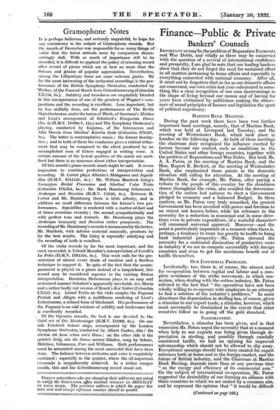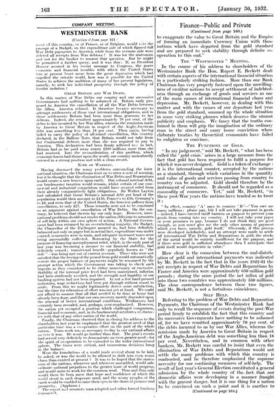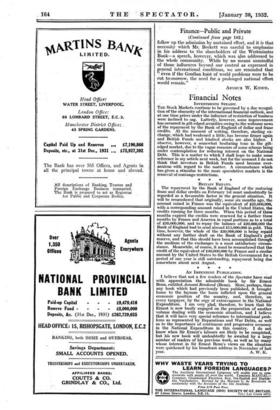Finance—Public & Private
Bankers' Counsels
ImPoirrs.vr as may be the problem of Reparation Payments and War Debts, and vitally as these may be connected with the question of a revival of international confidence and prosperity, I am glad to note that our leading bankers show that they do not forget the need for sustained effort in all matters pertaining to home affairs and especially in everything connected with national economy. After all, it must not be forgotten that so far as our domestic affairs are concerned, our own crisis last year culminated in some- thing like a clear recognition of our own shortcomings in the shape of living beyond our means and of having for years been victimized by politicians making the observ- ance of sound principles of finance and legislation the sport of political expediency.
MARTINS BANK MEETING.
During the past week there have been two further important bank meetings, namely, that of Martins Bank, which was held at Liverpool last Tuesday, and the meeting of Westminster Bank, which took place in London on the following day. At both of these meetings the chairman duly recognized the influence exerted by factors beyond our control, such as conditions in the United States and other foreign countries, together with the problem of Reparations and War Debts. But both Mr. A. A. Paton, at the meeting of Martins Bank, and the Hon. Rupert E. Beckett, at the meeting of Westminster Bank, also emphasized those points in the domestic situation still calling for attention. At the meeting of Martins Bank, for example, Mr. Paton, after paying a tribute to the people of this country for the steadiness shown throughout the crisis, also recalled the determina- tion of the nation last autumn to elect a Government pledged to economy and is balanced Budget. In these matters, as Mr. Paton very truly remarked, the present Government has been invested with power and, freedom to an extent not known before, while his reference to the necessity for a reduction in municipal and in some direc- tions even in private expenditure, of a wasteful character- will command universal approval. Moreover—and the point is particularly important at a moment when there is, perhaps, a tendency to trust too greatly to tariffs to bring back industrial prosperity—Mr. Paton stressed the necessity for a continued diminution of productive costs in industry if we are to compete successfully with foreign countries and even to get the maximum benefit out of tariffs themselves.
Om INDUSTRIAL Pawn:Ems.
Incidentally, too, 'there is, of course, the utmost need for co-operation between capital and labour and a com- plete avoidance of the strike movement, in which con- nexion, when dealing with the cotton industry, Mr. Paton referred to the fact that " the operatives have not been wholly willing to co-operate with employers in an attempt to find a solution of the industry's problems." In some directions the depreciation in sterling• has, of course, given a stimulus to our export trade, a stimulus, however, which must necessarily be diminished to the extent that other countries follow us in going off the gold standard.
SAresmaNsmr.
Nevertheless, a stimulus has been given, and in that connexion Mr. Paton urged the necessity that at a moment when help to our exports was being given through de- preciation in sterling, and possibly through carefully considered tariffs, we had an opening for improved salesmanship which should not be allowed to slip away. Exceptional openings should have been created for expert salesmen both at home and in the foreign market, and the future of British industry, said the Chairman at Martins Bank Meeting, depends more than at any previous time " on the energy and efficiency of its commercial arm." On the subject of international co-operation, Mr. Paton suggested the desirability of our forming an alliance with those countries to which we are united by a common aim, and he expressed the opinion that " it would be difficult
• • - • • ; •
(Continued on page 1024 Finance—Public and Private (Continued from page 160.)
to exaggerate the value to Great Britain and the Empire of forming an inunediate Currency Union with those nations which have departed from the gold standard and are prepared to seek stability through definite co- operation to this end."
THE " WESTMINSTER " MEETING.
In the course of his address to shareholders of the Westminster Bank the Hon. Rupert E. Beckett dealt with certain aspects of the international financial situation in a particularly striking fashion. More than one Bank Chairman has very properly fastened upon the unwilling- ness of creditor nations to accept settlement of indebted- ness through an exchange of goods and services as one of the main causes of international financial chaos and depression. Mr. Beckett, however, in dealing with this matter and with the causes of our departure last year from the gold standard, summed up the whole situation in some very striking phrases which deserve the utmost publicity and emphasis. We fancy that the truths con- tained in them will grip the imagination of the ordinary man in the street and carry home conviction where elaborate treaties by theoretical economists have failed to enlighten or convince.
THE FUNCTIONS OF GOLD.
" In my judgement," said Mr. Beckett, " what has been called the gold crisis ' arises in a large measure from the fact that gold has been required to fulfil a purpose for which it was never designed. Gold is a token of exchange : it is the international counter, accepted by the nations as a standard, through which variations in the quantity and value of goods and services passing from country to country can be adjusted. Gold should therefore be the instrument of commerce. It should not be regarded as a commodity of commerce. Yet," said Mr. Beckett, "in these post-War years the nations have tended so to treat it :
" In effect, country ' A' says to country ' B'—` You owe me many millions : please pay, but I will not take payment in goods —indeed, I have erected tariff barriers on purpose to prevent your goods from coming into my country. 1 will not take your paper or your promises to pay, because I do not think they are good enough, so you must give me the -only other means of payment which you have, namely, gold itself.' Obviously, if this process were des-eloped indefinitely, and en attempt were made to settle all international War Debts and Reparations in gold, the stocks of the metal would be entirely insufficient for the purpose, and if there were gold in sufficient abundance then I anticipate that gold itself would depreciate in value."
How clear is the connexion between the mal-distrib- ution of gold and international payments was indicated by Mr. Beckett in the fact that in the years 1922-31 the net receipts in respect of War Debts and Reparations by France and America were approximately 650 million gold pounds ; during the same period the net influx of gold into those two countries was approximately 550 millions. The close correspondence between these two figures, said Mr. Beckett, is not a fortuitous coincidence.
SELF HELP.
Referring to the problem of War Debts and Reparation Payments, the Chairman of the Westminster Bank • had only to recall the sequence of events during the post-War period firmly to establish the fact that this country and its successive Governments have nothing to be ashamed of, for we have remitted approximately 70 per cent. of the debts incurred to us by our War Allies, whereas the remission made by America to Great Britain in respect of the Anglo-American debt was something less than 18 per cent. Nevertheless, and in common with other bankers, Mr. Beckett was careful to insist that even the elimination of War Debts and Reparations would not settle the many problems with which this country is confronted, and he therefore emphasized the supreme necessity for our continuing measures of self-help. The result of last year's General Election constituted a general admission by the whole country of the.. fact that our domestic affairs Were developing in a manner fraught with the gravest danger, but it is one thing fOr a-nation to. be convinced on such a point and it is -another to (Continued on page 168.) Finance—Public and Private
(Continued front page 162.) follow up the admission by sustained effort, and it is that necessity which Mr. Beckett was careful to emphasize in his address to the shareholders of the Westminster Bank—a speech, boweyer, which was also addressed to the whole community. While by no means unmindful . of those influences beyond our control as expressed in general international conditions, we are reminded that `! even if the Gordian kn'ot of world problems were to be cut to-morrow, the need for a prolonged national effort would remain."
ARTHUR W. KIDDY.






































 Previous page
Previous page